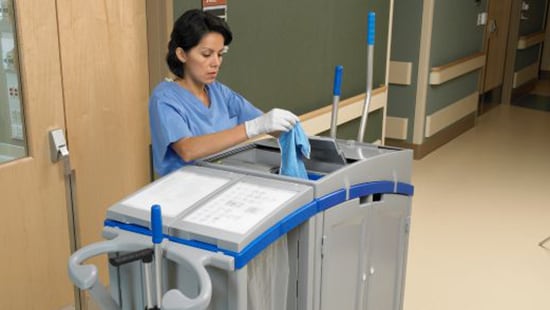Coronavirus: Healthcare Infection Control Precautions for COVID-19
Ecolab Disinfectants are Effective Against The COVID-19 Coronavirus.

Human coronaviruses1 are common throughout the world and commonly cause mild to moderate illness. Two newer human coronaviruses, MERS-CoV and SARS-CoV, have been known to cause severe illness. A novel coronavirus, 2019-nCoV acute respiratory disease, emerged in 2019 and is causing concern.
What is 2019-nCoV acute respiratory disease (2019-nCoV)?2
- Chinese authorities identified the new coronavirus originating in Wuhan, China.
- This virus has resulted in thousands of confirmed cases, including cases outside Wuhan, with additional cases being identified in a growing number of countries internationally. The first case in the United States was announced on January 21st and in Europe (France) on January 24th.
- Clinical signs and symptoms include fever and symptoms of lower respiratory illness (e.g., cough, shortness of breath).
- Early on, many patients in the outbreak in Wuhan, China reportedly had some link to a large seafood and animal market, suggesting animal-to-person spread. However, a growing number of patients reportedly have not had exposure to animal markets, suggesting person-to-person spread is occurring, though it’s unclear how easily or sustainably this virus is spreading between people. Both MERS and SARS have been known to cause severe illness in people. The situation with 2019-nCoV is still unclear and evolving rapidly. While severe illness, including illness resulting in numerous deaths, has been reported in China, other patients have had milder illness and been discharged. Person-to-person transmission has been reported in healthcare workers who were caring for some of the ill people in China.
What are the healthcare infection control precautions for 2019-nCoV?3
Although the transmission dynamics have yet to be determined, the CDC and WHO currently recommend a cautious approach to patients under investigation for 2019 Novel Coronavirus:
- Standard recommendations to prevent infection spread include regular hand washing, covering mouth and nose when coughing and sneezing and thoroughly cooking meat and eggs. Avoid close contact with those patients who are infected, if possible.
- Avoid close contact with anyone showing symptoms of respiratory illness such as coughing and sneezing.
- Patients should be asked to wear a surgical mask as soon as they are identified and be evaluated in a private room with the door closed, ideally an airborne infection isolation room if available.
- Healthcare personnel entering the room should use standard precautions, contact precautions, airborne precautions, and eye protection (e.g., goggles or a face shield). The healthcare facility’s infection control personnel and local health department should be notified immediately. Meticulous hand hygiene and environmental hygiene play a key role in these isolation precautions.
What hand hygiene products are effective against 2019-nCoV?
Performing hand hygiene by routinely washing your hands with soap and water or using alcohol-based handrub (ABHR) with a specific claim for efficacy against enveloped viruses is one of the best ways to avoid transmission of emerging pathogens. All recommended products are compliant with EN14476 or have limited spectrum activity against vaccinia virus according to EN 14476.
The products listed below are not available in all countries/regions. Please contact your local Ecolab sales representative for availability information.
| APPLICATION AREA | ECOLAB PRODUCT |
|---|---|
| Alcohol-Based Handrub | AniosGel 800 |
| Alcohol-Based Handrub | AniosRub 800 |
| Alcohol-Based Handrub | AniosGel 85 NPC |
| Alcohol-Based Handrub | AniosRub 85 NPC |
| Alcohol-Based Handrub | Skinman Foam |
| Alcohol-Based Handrub | Skinman Soft Plus |
| Alcohol-Based Handrub | Skinman Soft Protect |
| Alcohol-Based Handrub | Spirigel Complete |
What disinfectants are effective against 2019-nCoV?
Disinfection of hard, non-porous surfaces is key to maintaining a safe environment, preventing the transmission of emerging pathogens. All recommended products are compliant with EN 14476 or have limited spectrum activity against vaccinia virus according to EN 14476.
The products listed below are not available in all countries/regions. Please contact your local Ecolab sales representative for availability information.
.What work is still ongoing?
- Screening of travelers from Wuhan, China.
- Restrictions on travel from the central Chinese cities, Huanggang, Ezhou and Wuhan
- Determining the origin of the virus, which could lead to recommended guidance related to transmissions from animals.
- Determining disease progression among ill people and how they may have acquired the infection
- Determining the frequency and likelihood of person-to-person transmission
For More Information:
World Health Organization, Coronavirus: www.who.int/health-topics/coronavirus
References:
1. Centers for Disease Control and Prevention, Coronavirus Summary. www.cdc.gov/coronavirus/index.html
2. Centers for Disease Control and Prevention, 2019 Novel Coronavirus. www.cdc.gov/coronavirus/2019-nCoV/summary.html
3. World Health Organization, Coronavirus www.cdc.gov/coronavirus/2019-nCoV/infection-control.html
4. Centers for Disease Control and Prevention, Interim Healthcare Infection Prevention and Control Recommendations for Patients Under Investigation for 2019 Novel Coronavirus. www.cdc.gov/coronavirus/2019-nCoV/infection-control.html
5. Environmental Protection Agency, Emerging Viral Pathogen Guidance for Antimicrobial Pesticides. www.epa.gov/pesticide-registration/emerging-viral-pathogen-guidance-antimicrobial-pesticides



